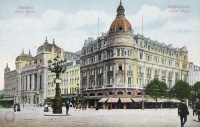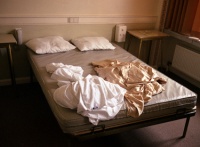Hotel
From The Art and Popular Culture Encyclopedia
|
"I recalled a novel I had once read about, in which a man had spent his days peering through a hole in the wall of his hotel room, at the life that comes and goes next door."--The Outsider (1956) by Colin Wilson "Hotel novels include "Vicki Baum, Menschen in Hotel (1931); Joseph Roth, Hotel Savoy; Thomas Mann, Felix Krull; the Zauberberg sanatorium as hotel for the sick ; Christopher Isherwood, Goodbye to Berlin, to name a few."--Critique of Cynical Reason (1983) by Peter Sloterdijk "Inspirations for the Grand Hotel in The Grand Budapest Hotel came from spas and hotels such as the Hotel Adlon in Berlin, the Grandhotel Pupp in Karlovy Vary, and the Savoy Hotel in London."--Sholem Stein |
|
Related e |
|
Featured: |
A hotel is an business that provides paid lodging on a short-term basis. Facilities provided inside a hotel room may range from a modest-quality mattress in a small room to large suites with bigger, higher-quality beds, a dresser, a refrigerator and other kitchen facilities, upholstered chairs, a flat screen television, and en-suite bathrooms. Small, lower-priced hotels may offer only the most basic guest services and facilities. Larger, higher-priced hotels may provide additional guest facilities such as a swimming pool, business centre (with computers, printers, and other office equipment), childcare, conference and event facilities, tennis or basketball courts, gymnasium, restaurants, day spa, and social function services. Hotel rooms are usually numbered (or named in some smaller hotels and B&Bs) to allow guests to identify their room. Some boutique, high-end hotels have custom decorated rooms. Some hotels offer meals as part of a room and board arrangement. In Japan, capsule hotels provide a tiny room suitable only for sleeping and shared bathroom facilities.
The precursor to the modern hotel was the inn of medieval Europe. For a period of about 200 years from the mid-17th century, coaching inns served as a place for lodging for coach travelers. Inns began to cater to richer clients in the mid-18th century. One of the first hotels in a modern sense was opened in Exeter in 1768. Hotels proliferated throughout Western Europe and North America in the early 19th century, and luxury hotels began to spring up in the later part of the 19th century.
Hotel operations vary in size, function, complexity, and cost. Most hotels and major hospitality companies have set industry standards to classify hotel types. An upscale full-service hotel facility offers luxury amenities, full-service accommodations, an on-site restaurant, and the highest level of personalized service, such as a concierge, room service, and clothes pressing staff. Full-service hotels often contain upscale full-service facilities with many full-service accommodations, an on-site full-service restaurant, and a variety of on-site amenities. Boutique hotels are smaller independent, non-branded hotels that often contain upscale facilities. Small to medium-sized hotel establishments offer a limited amount of on-site amenities. Economy hotels are small to medium-sized hotel establishments that offer basic accommodations with little to no services. Extended stay hotels are small to medium-sized hotels that offer longer-term full-service accommodations compared to a traditional hotel.
Timeshare and destination clubs are a form of property ownership involving ownership of an individual unit of accommodation for seasonal usage. A motel is a small-sized low-rise lodging with direct access to individual rooms from the car park. Boutique hotels are typically hotels with a unique environment or intimate setting. A number of hotels have entered the public consciousness through popular culture, such as the Ritz Hotel in London. Some hotels are built specifically as destinations in themselves, for example casinos and holiday resorts.
Most hotel establishments are run by a general manager who serves as the head executive (often referred to as the "hotel manager"), department heads who oversee various departments within a hotel (e.g., food service), middle managers, administrative staff, and line-level supervisors. The organizational chart and volume of job positions and hierarchy varies by hotel size, function and class, and is often determined by hotel ownership and managing companies.
See also



